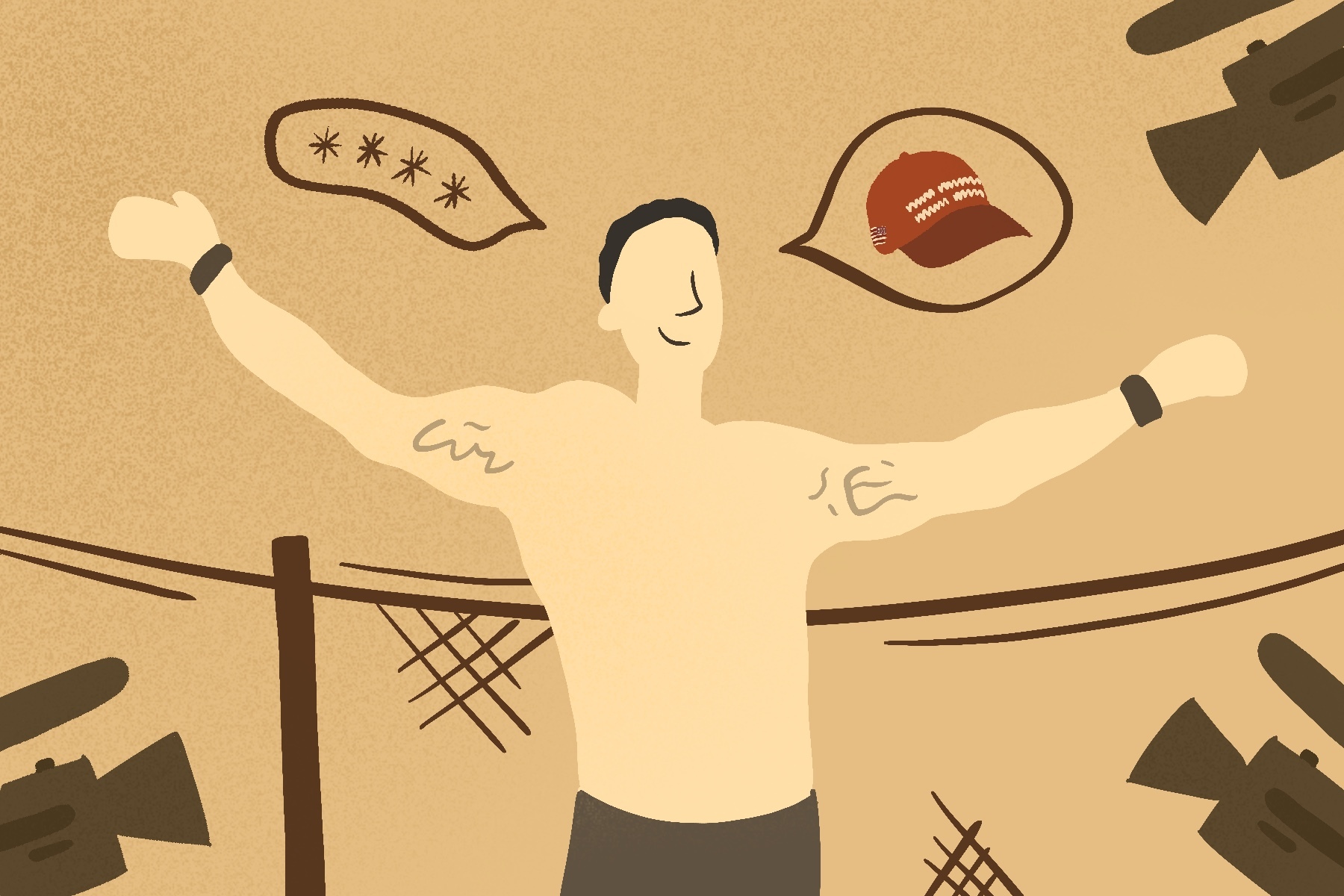Top Ultimate Fighting Championship (UFC) welterweight contender Colby Covington is many things: a former interim champion, a former collegiate wrestler and a well-rounded mixed martial artist. That said, most people who follow mixed martial arts (MMA) tend to overlook Covington’s achievements and fixate instead on his controversial persona and inflammatory speech. Trash talk and fight promotion are nothing new in combat sports, but Covington’s antics, particularly his politically charged banter and excessively personal attacks, have led many to argue that he has crossed the line, even for the fight game.
Covington did not always act this way. Early on in his UFC career, the young contender acted respectfully in interviews, focusing only on his performance inside the cage. According to Covington, his transformation was a calculated move that began before his fight with former title challenger Demian Maia in 2017.
After defeating the Brazilian in front of an angry crowd in São Paulo, Covington dropped one of the most incendiary interviews in the sport’s history. He referred to the people of Brazil as “filthy animals,” which quickly generated attention and controversy. Covington later claimed that prior to the fight, the UFC told him that regardless of the outcome, the company would not renew his contract, so he gave the interview to preserve his spot within the organization.
The Next Phase of Covington’s Career
Following this win, Covington became most notable for his willingness to insult just about every fighter on the roster, along with his strong support for former President Donald Trump and his politics. These facets of his personality have incurred widespread dislike from fans and fellow fighters alike.
Despite the increase in public backlash, Covington continued to find success in his UFC career. In 2018, he defeated former UFC lightweight champion Rafael dos Anjos in dominant fashion, which made him the interim champion. Although this win should have lined him up for a title shot against the undisputed champion, Tyron Woodley, contract disputes with the UFC prevented this fight from materializing.
While Covington sat on the sidelines, his rival Kamaru Usman defeated Woodley and became the new undisputed welterweight champion. Although Covington expected to have the opportunity to fight Usman immediately, the UFC instead had him face former champion Robbie Lawler, a fight Covington dominated in an impressive fashion. Following this win, Covington and Usman engaged in a verbal altercation that began the buildup for their fight.
During this period, several of Covington’s teammates at the American Top Team gym in Florida publicly criticized Covington for his antics, and as time went on, Covington found himself at odds with several fighters, including his teammate Dustin Porier and his former roommate Jorge Masvidal. Covington also received criticism for insulting Usman’s deceased mentor, Glenn Robinson, and for taking jabs at the incarceration of his father, Muhammed Usman.
In December 2019, Covington’s impressive UFC winning streak came to an end at the hands of Usman. Covington still earned widespread praise for his performance, in which he landed several impressive strikes on the champion and arguably won most of the rounds before losing by TKO with less than a minute remaining in the competition. Despite the loss, Covington’s abrasive persona did not abate; he slandered referee Marc Goddard for allegedly stopping the fight prematurely and insisted that he would decisively defeat Usman in a rematch.
During this time, Covington’s political leanings grew even more extreme. He began hurling insults at athletes like Lebron James, who expressed anti-Trump sentiments. Furthermore, Covington’s staunch law enforcement support during the protests following the murder of George Floyd made him an even more polarizing figure in the MMA community.
The Result of Covington’s Controversy
The political aspect of Covington’s persona came to a head in his most recent fight against former champion Tyron Woodley in 2020. While Woodley staunchly aligned himself with the Black Lives Matter movement, Covington remained committed to his usual antics. Although the controversy between Covington and American Top Team resulted in him leaving the famous gym, he quickly found another dedicated coaching staff at MMA Masters.
The new partnership paid immediate dividends in Covington’s dominant win over Woodley. Covington became the first fighter to finish Woodley in the UFC, and after his win, he once again doubled down on his political beliefs and expressed his support for Trump. In the post-fight press conference, he continued decrying left-leaning athletes as “communists” before calling out Masvidal for a potential fight.
In light of the obviously contrived nature of Covington’s persona, questions have emerged regarding the line between marketing and malicious behavior. Covington’s defenders argue that Covington has otherwise shown himself to be a humble and respectful athlete, and he thus should not be held accountable for his controversial remarks. In certain interviews, Covington himself defends his actions, arguing that the UFC’s business model forces him to act in this manner to bring public attention to his fights. If one believes Covington’s story about the lead-up to the Demian Maia fight, his antics not only helped keep him in the UFC, but also propelled him to an interim title and an undisputed title shot.
However, fighters who have experience with Covington behind closed doors — including Masvidal, Porier, Jon Jones and Woodley — claim that even outside of his public persona, Covington has repeatedly exhibited dishonest and unethical behavior. They also argue that his fight promotion rationale does not justify some of his public remarks. After all, many other fighters have gained popularity and have successfully talked trash without mentioning family or political movements.
Covington’s persona, while understandable to a degree, has undeniably crossed ethical lines. Although he may not have intended to do so, his public remarks ultimately cause further divide in a society already plagued by systemic racism and inequality. That said, Covington’s mixed martial arts skills themselves are unquestionable, and by all accounts, he has demonstrated a tremendous work ethic and a genuinely impressive determination to become the undisputed welterweight champion of the world. Recognizing Covington’s warrior spirit and athletic performance can and should be separated from condoning his personal beliefs and actions. Attributes such as unyielding determination and true skill have universal appeal for anyone, regardless of political beliefs.
















